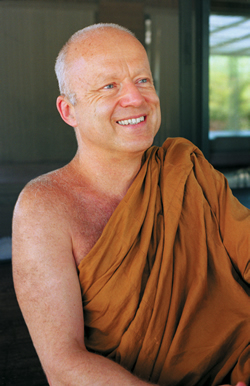


 |
Issue Contents :: Feature :: Being A Monk :: Page [ 1 2 3 4 ]
Being A Monk
A Conversation with
Thanissaro Bhikkhu
(Geoffrey DeGraff '71)

Several years ago, while I was preparing for a trip to South-east Asia–in part to learn about Buddhism–a friend suggested that I first contact Thanissaro Bhikkhu, the abbot of the Metta Forest Monastery in northern San Diego County. Despite his imposing Thai name, this monk was actually raised in rural New York and Virginia under an equally imposing American name: Geoffrey Furguson DeGraff.
As an Oberlin student, Geoff was introduced to meditation during a winter-term seminar in 1969. He graduated in 1971, and then served as a Shansi rep in Thailand for two years. After returning there in 1976, he was ordained a monk and spent the next 15 years immersed in the Forest monastery tradition of Theravada Buddhism (see sidebar). He returned to the United States in 1991 to establish the Metta Forest Monastery, an American equivalent of the Thai Forest retreats.
Known informally as "Than Geoff," Thanissaro Bhikkhu has written several books on Buddhism and Vipassana (Insight) meditation. Fluent in Thai and Pali, the languages of early Buddhist writings, he has translated the writings of two noted Thai abbots and four volumes of the Pali Canon. In short, he knows his Buddhism.
Although I was anxious during our first phone call, Than Geoff was relaxed and friendly. He started me on an exploration into Buddhism that I've both embraced and tried to avoid almost every day since. Over the years, we've had lengthy conversations about almost everything. But I still had countless questions for him–personal questions I suspected other people also would like to ask a monk. When I suggested an interview, Than Geoff replied instantly, "Sounds like fun." A few months later, on a warm September afternoon at his monastery, Than Geoff and I began to talk.
You arrived at Oberlin as a freshman in 1967. I assume you chose Oberlin because you knew it would give you the best undergraduate training possible to become a Buddhist monk.
That was the last thing on my mind. As a junior in high school reading American history, I read how Oberlin was among the first coed and integrated colleges in the country, and that interested me. I also liked that it had classical music. I was a classical music fanatic.
The Thai Forest Tradition, founded in the late 19th century, is known for its strict adherence to monastic discipline and its emphasis on the full-time practice of meditation. The tradition derives from the belief that the Buddha himself gained awakening in a forest, gave his first sermon in a forest, and passed away in a forest. The qualities of mind he developed to survive in the wild–both physically and mentally–were key to his teachings. |
No. In high school, I had been an American Friends Service (AFS) student in the Philippines. On the plane coming back home, I met two guys who had been to Thailand and been ordained as novices (a kind of apprentice monk). They explained the Four Noble Truths, the most fundamental teaching of the Buddha. It made a lot of sense to me. Also, my girlfriend's father was a military man who had been stationed in Thailand. She had lots of stories to tell about Thailand as well. I was intrigued.
Did your interest grow at Oberlin?
During my sophomore year, during Oberlin's very first winter term, Don Swearer, a professor of religion, brought in a monk from Japan and a monk from Thailand to teach meditation. I signed up immediately. I remember thinking, "This is a really cool skill. You sit down and breathe, and you come up an hour later a much better person." That's what I liked about meditation from the beginning: learning how to bring your mind under control and find happiness inside.
Next Page >>